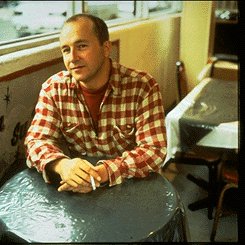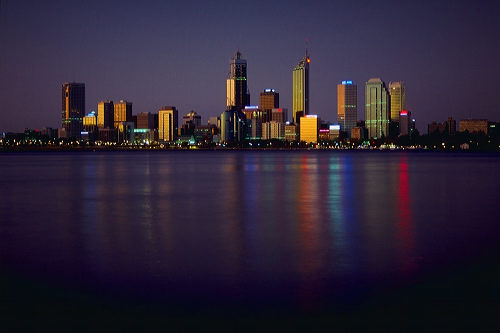The Triffids
(Bands from Perth, Australia)
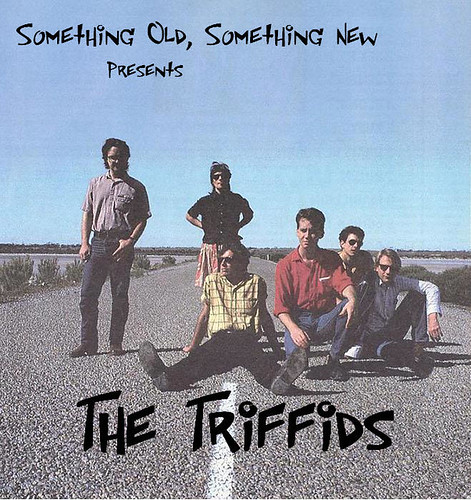
This is my 101st post, so I thought I’d introduce you to a band who are possibly my favorite from my home town of Perth – The Triffids.
I saw many of their shows in the early 1980s, watching them mature and travel ever farther from home. I also saw them overseas in 1987 in London (at the Town and Country in Kentish Town) and at the 1987 Roskilde festival in Copenhagen, Denmark (along with fellow aussies The Go-Betweens, The Hoodoo Gurus and Stelarc). The Triffids were well received at both events (especially at Roskilde). I have a cassette tape recording of the show at the T&C, but sadly the quality is atrocious (what can you expect for a couple of pounds in the Camden Markets?)
The Triffids always put on a good show and their sound grew from their early days, when they had a stronger folk-rock influence in the late 1970s, through to their early to mid 1980’s post-punk sound, when they started releasing vinyl with a darker lyrical and musical influence, through to the mid to late 1980s when better production (and budgets) and considerable overseas travel and label interest helped to bring their final musical vision and widescreen studio ambitions to the world.
My favourite time for The Triffids was the years 1982 – 1987, as they had mastered their craft and had just started making inroads into Europe, but hadn’t lost any of that dark edge which epitomized many of the better Australian bands of the period. (I’ll have to do a post on this theme at a later date.)
The Triffids began life in Perth on November 27, 1976 when David McComb and Allan 'Alsy' MacDonald - best friends and musical fanatics - played together for the first time as Dalsy, an “experimental” duo with David playing one-string guitar and Alsy on drums. Dalsy also created paintings and sculptures, wrote poetry and a book called “Lunch”.
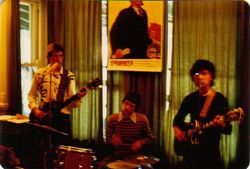
Dalsy went on to annoy their family (and anyone else they could) with the songs they wrote and performed with Phil Kakulas (now in the Blackeyed Susans), Andrew McGowan, Julian Douglas-Smith and later Byron Sinclair, Will Akers and Margaret Gillard. After Dalsy, the collective became known as Blök Musik, Logic (for a day) and finally The Triffids.
A major influence on the group's sound was their geographical location, living in the world’s most isolated city on the west coast of Australia, facing a cold ocean and backing onto a huge, empty desert. The isolation infused The Triffids' early work with a feeling of emptiness and loneliness. The band were also influenced by the music of Patti Smith, Kraftwerk, Television and early Talking Heads.
But it wasn’t only the Triffids sound that made them unique. David McComb’s lyrical competence and constant experimenting with the themes of love and death (not always in the same song) and typically Australian influences and experiences, as well as his ability to tell an interesting story, marked the Triffids apart from many of their peers. Perhaps rightly, they were often compared with The Go-Betweens.

Between 1978 and 1981 the Triffids recorded (some were even recorded at home) and released six cassette tapes and in 1981 they released their first single, “Stand Up // Farmers Never Visit Nightclubs”. The production of this single was the prize for the Triffids winning a song competition run by the Western Australian Institute of Technology (now Curtin University) Student Guild's radio show on 6NR.
During this time they would play at parties and school dances and also became regulars at The Stoned Crow in North Fremantle and the Broadway Tavern in Nedlands. They were often playing with bands in the punk scene in Perth, including The Victims (half of whom went on to become The Hoodoo Gurus) and The Cheap Nasties (who would become The Scientists and The Mannikins), and were receiving some negative responses to their performances, especially from the skinheads who were frequenting the punk scene. Perth at the time had a huge, and relatively recent, influx of English migrants and the aggressive skinhead scene in Perth would be felt throughout many parts of the community. I remember parties in the early 1980s were regularly overrun by gangs of skinheads out for a fight or looking to pull some girls (or both).
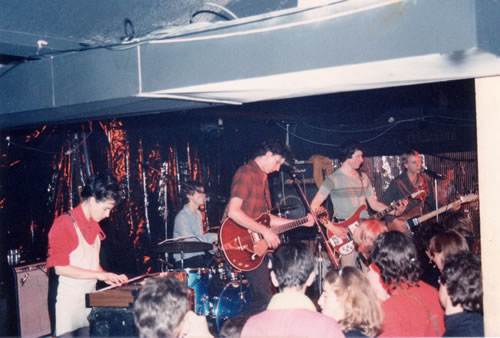
1982 saw the release of the “Reverie” four track EP (Reverie / Place in the Sun // Joan of Arc / This Boy). Around this time, due to the small population/market in Perth, the band started the long journey driving from Perth to Sydney and Melbourne (and back again) to play shows and do some recording and to live for large periods of time, often in quite squalid conditions. For a mere $150 a night the Triffids’ services as a support band were procured by the likes of The Reels, The Sunnyboys, The Church, Hunters and Collectors ... and the Uncanny X-men.
The Triffids signed to White Label in Melbourne and released the “Spanish Blue // Twisted Brain” single and the “Bad Timing” EP (Bad Timing / Left to Rot // Being Driven / Snake Pit).
But the Triffids soon signed on with Hot Records, which during its existence between 1982 and 1986 brought the Australian independent scene some much needed cohesion. They were one of the bands leading Hot’s drive into the overseas market, which is a part of what eventually led to the label’s demise.
Their debut minor masterpiece album Treeless Plain was released at the end of 1983 (Red Pony / Branded / My Baby Thinks She's A Train / Rosevel / I Am A Lonesome Hobo / Place in the Sun // Plaything / Old Ghostrider / Hanging Shed / Hell of A Summer / Madeline / Nothing Can Take Your Place), an album completely out of tune with everything else going on in the Australian alternative music scene at the time.
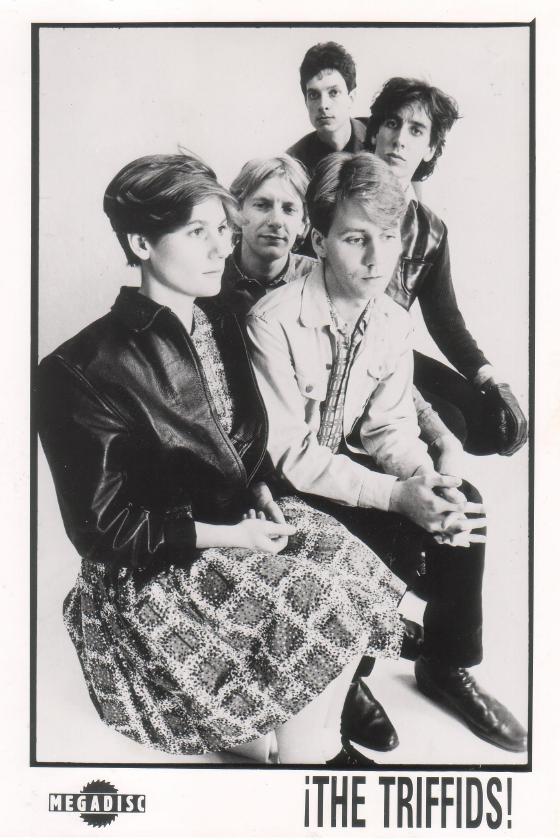
The band had also finally formed the long standing lineup of Alsy MacDonald (drums), David McComb (lead vocals, guitar), Robert McComb (violin, guitar), Martyn Casey (bass) and Jill Birt (organ, vocals). Treeless Plain contained many classic tracks including “Red Pony”, “My Baby Thinks She's A Train” and “Hell Of A Summer” and it is a very consistent and unique sounding debut album. All of the songs for “Treeless Plain” were recorded over twelve midnight-to-dawn sessions at Emerald City Studios, Sydney in August and September 1983.
Their next single, “Beautiful Waste // Property is Condemned” and the Raining Pleasure 12” EP (Jesus Calling / Embedded / St James Infirmary // Everybody Has To Eat / Ballad of Jack Frost / Property is Condemned / Raining Pleasure) were released in 1984.
By this time the Triffids had spent so much time traveling the 3000 miles between the west and east coasts of Australia (David McComb estimated that they made this trip between 12 and 16 times) that they decided to travel that little bit further and headed to Europe and the next phase in their amazing, but sadly neglected (beyond cult status), career.
The Triffids arrived in London in August 1984 with a wad of cash they’d saved up and 5 return plane tickets scheduled to expire by Christmas. They began by playing gigs with the The Go-Betweens and were soon supporting Echo and the Bunnymen.
On November 6th, 1984 the Triffids recorded the “Field of Glass” 12” EP (Bright Lights Big City / Monkey On My Back // Field Of Glass) mostly live at BBC Studio 5 in London and then returned for a brief tour of Australia. Apparently the Field Of Glass track wasn’t released on CD because the master tape couldn’t be found, although it was eventually discovered under David McComb’s bed.
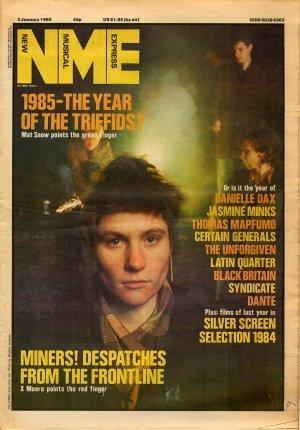
The band had given themselves three months to make inroads in the UK and ended up on the cover NME’s first edition of 1985, which predicted it would be “The Year Of The Triffids”.
During this time home they also acquired their final permanent band member, pedal-steel player ‘Evil’ Graham Lee, who had recorded the mini-album, “Lawson Square Infirmary” with most of the band in 1984. The pedal steel wasn’t an instrument often used in rock music and its distinctive, sweeping tones gave the Triffids an ethereal quality and helped to redefine their sound, and it was especially used to great effect on Born Sandy Devotional.
Together they recorded the 12” EP “You Don’t Miss Your Water”, the A-side a countrified version (yep, already showing the influences of working with “Evil” Lee) of a William Bell song (You Don't Miss Your Water // Convent Walls / Beautiful Waste / You Don't Miss Your Water (instrumental)) and were sent back to London.
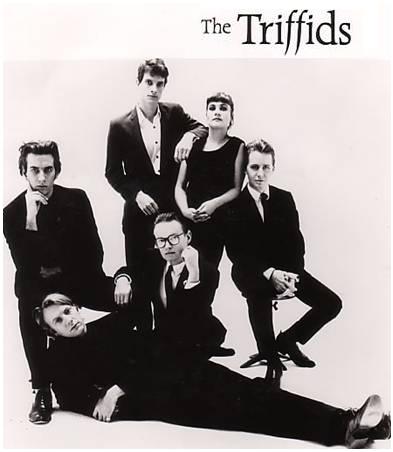
The Triffids again returned to Europe, to some success. To quote a letter from Moodist Steve Miller to excellent Australian author/journo Clinton Walker (from Walker’s book “Stranded”) written around this time, “Luckily the Triffids have so much money they wipe their bums with the stuff and they’ve more or less kept us alive”.
In August 1985, unable to raise a major record deal and out of desperation, the Triffids paid for themselves to go into the studio and recorded possibly their most Australian-sounding album, the wonderful sophomore album Born Sandy Devotional (The Seabirds / Estuary Bed / Chicken Killer / Tarrilup Bridge / Lonely Stretch // Wide Open Road / Life Of Crime / Personal Things / Stolen Property / Tender Is The Night (The Long Fidelity)). The musical and lyrical content of this album paints a wonderful portrait of Australia – if you’re going on a long drive, this is a great album to take along and listen to. This would also prove to be their breakthrough album, especially at a cult level, and their high water mark commercially as the album reached # 27 on the UK charts and the track “Wide Open Road” received widespread (albeit minor) success and would go on to become the band’s signature tune.
There is a great review of Born Sandy Devotional here.
The band released two versions of the “Wide Open Road” single (7” version = “Wide Open Road // Time of Weakness” and 12” version = “Wide Open Road // Time of Weakness / Dear Miss Lonely Hearts /Native Bride). The single peaked at #26 on the UK charts while only reaching #64 in Australia
In Belgium, Holland, Germany, France and particularly Scandinavia, the Triffids became big business. The fickle European rock press devoured the unusual sounds and intriguing lyrics that captured Australia's intimidating landscape and in Belgium, they played to 70,000 fans.
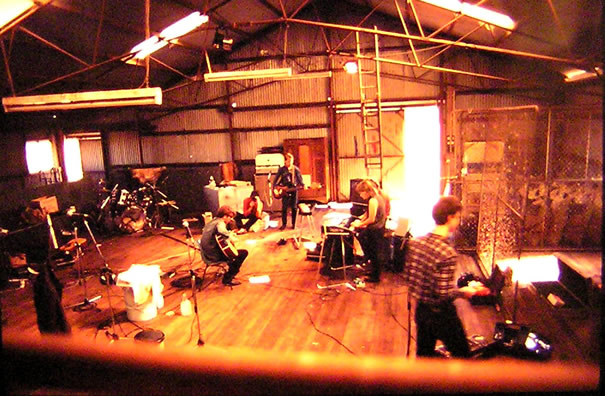
After returning to Australia (yet again) in 1986 the Triffids quickly retired to a wool shed on a sheep farm in Ravensthorpe (a small town in a remote part of south west Western Australia, 600kms south-east of Perth) to record a very live sounding album to 8 track, In The Pines (Suntrapper / In the Pines / Kathy Knows / 25 to 5 / Do You Want Me Near You? / Once a Day // Just Might Fade Away / Better Off This Way / Only One Life / Keep Your Eyes on the Hole / One Soul Less On Your Fiery List /Born Sandy Devotional / Love and Affection).
In 1986 the Triffids were on the bill and touring Australia with the cream of bigtime Oz rock (INXS, Divinyls, The Saints, Jimmy Barnes, Mental As Anything, the Models and I’m Talking) as part of the infamous Australian Made tour. The Triffids had finally attracted the attention of their peers, the music media and the fans on a larger stage. Apparently Michael Hutchence had insisted on the Triffids being on the bill.
1987 saw the release of 3 tracks recorded for John Peel on May 5th, 1985, “The Peel Sessions” (Life of Crime / Chicken Killer // Lonely Stretch).
Departing from Hot, the Triffids eventually landed a major contract with Island Records who signed the band to a three-album deal.
Between April and August 1987 the band worked with producer Gil Norton (who had worked with Echo and the Bunnymen and would go on make his name with the Pixies) in London to record Calenture (Bury Me Deep In Love / Kelly's Blues / Trick Of The Light / Hometown Farewell Kiss / Unmade Love / Open For You // Holy Water / Blinder By The Hour / Vagabond Holes / Jerdacuttup Man / Calenture / Save What You Can). The singles released from this album were “Bury Me Deep In Love”, “Trick Of The Light” and “Holy Water”.
The album title referred to the type of insanity which used to be suffered by seamen crossing the oceans, which led the affected person imagining the sea to be a green field and throwing himself into it. The nomadic Triffids travelling back and forth from Australia to England to record a 'difficult' album, obviously related to the disoriented seamen. Unfortunately due to Gil Norton's excessive production techniques, the band's personality barely surfaces although it still has some strong tracks.
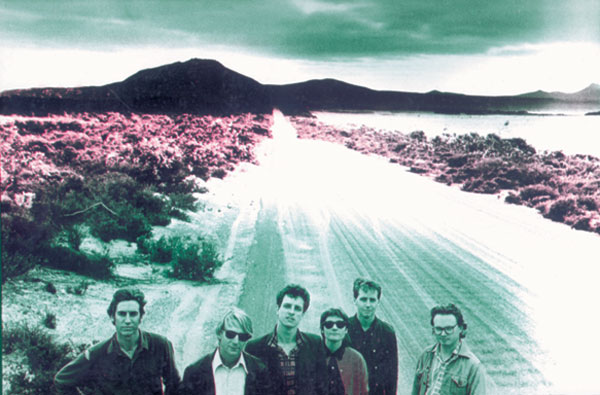
In 1988 the band released yet another cassette album, the absurdly rare (50 copies only) “Jack Brabham” (Dead Wind (82) / Pleasure Slide (84) / Nervous Breakdown (84) / When A Man Turns Bad (84) / Slow Decay (83) / The Long Fidelity (84) / A Curse On Me (85) / Kathy Knows (85) / Wide Open Road (86) / How Could I Hope To Love You (87) / Wish To See No More (86) / Burned (85) / Sweet Jane (84) // Snake Pit (82) / Raining Pleasure (87) / Good Morning (87) / Suspicious Minds (84) / Old Ghostrider (83) / Femme Fatale (84) / Too Hot To Move (87) / Mellow Yellow (84) / Satisfied Mind (84) / Gilligan's Island (84) / Hope You Recover Soon (86) / She's Sure The Girl I Love (86) / Lanallu (82) / Mercy (86) / Born Sandy Devotional (86) / Rosevel (87)). This tape was only sold at the Triffids’ Perth shows on 19th and 20th December 1988 and included in the sleeve notes - "ninety minutes of rare (and under cooked) snippets of tunes allegedly attributed to the Triffids. Beware of wildly fluctuating recording and performing quality".
The final Triffids studio album, an eclectic collection which suggested that the band had finally lost their control and direction, was recorded between September and October 1988 in Somerset, UK and produced and engineered by Stephen Street, The Black Swan (Too Hot To Move, Too Hot To Think / American Sailors / Falling Over You / Goodbye Little Boy / Bottle Of Love / The Spinning Top Song /Butterflies Into Worms / New Year's Greetings / Good Fortune Rose / One Mechanic Town / Blackeyed Susan / The Clown Prince / Fairytale Love). The singles released from “The Black Swan” were “Goodbye Little Boy” and “Falling Over You”. Sadly, to my ears, this is a very mixed album which doesn’t really sound like the band I knew and loved. It was well received, but the success wasn't overwhelming, which disappointed the band members to the point where they soon after dissolved.
Even though the Triffids found time for a quick fling in America in 1989, they were soon-after no more, although 1990 saw the release of the live “Stockholm” album, which completed the Triffids’ contractual obligations with Island.
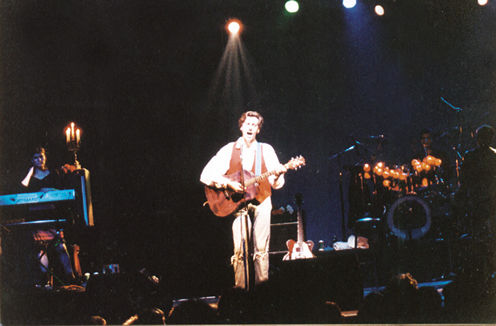
Although largely ignored at home by the music industry, after the Triffids had disbanded they were posthumously awarded a West Australian Music Industry lifetime-achievement award, in 1990. Ironically, the industry apparently hadn't counted on anyone representing the band to be there to accept the award, until keyboardist Jill Birt stepped out of the crowd and up onto the stage ... in her cocktail waitress uniform. She had found employment serving drinks at the casino where the ceremony was held and after saying a nervous thank you she returned to clear the tables of the well-heeled, black tie industry brigade who had come to pay tribute.
Martyn Casey went on to become a Blackeyed Susan and is now a Bad Seed with Nick Cave.
Alsy McDonald (who is now a lawyer for the Equal Opportunity Commission) and Jill Birt (who is now an architect) got married and started a family.
Robert McComb is teaching in Melbourne.
‘Evil” Graham Lee runs the W. Minc label and also guardian of David McComb's musical legacy and runs The Triffids web site.
David McComb went on to work with the Blackeyed Susans before mounting a solo career with his 1994 album “Love of Will”. He also worked with many other musicians on various projects, including assembling a band, the Red Ponies, to tour Europe. Another project, costar, was formed when David move to Melbourne, but due to his ill health they only played sporadically around Melbourne, recordings had barely begun and a single was ready for a limited release.
McComb suffered health problems due to a drug and alcohol problem which resulted in a heart transplant in 1996. Following a car accident in Melbourne, David McComb was admitted to St Vincents hospital overnight. Only 3 days later he died at home, on February 2, 1999, just a few days short of his 37th birthday, a result of complications following the car accident and the heart transplant, although "heroin toxicity and mild acute rejection of his 1996 heart transplant" was recorded on his death certificate.
I remember reading about David McComb’s death in the Sydney Drum Media street press one warm afternoon traveling home from work, only a few days later. It was only a small article which I read while crossing the Sydney Harbor Bridge on the train, and I had a physical reaction I hadn’t before, or since - an acute loss of breath and a pain in my chest which caused me to slump forward in my seat and made my feel dizzy for several minutes. I never knew David, but felt I had grown with him somehow, and returned home to drink a few beers to the man and his legacy and to play Born Sandy Devotional.
David McComb was inducted into the West Australian Music Industry Hall Of Fame as a composer on 21 February 2006.
The Triffids albums are about to be re-released by Domino Recording Company. On 12th June 2006, 20 years after its original release, The Triffids classic ‘Born Sandy Devotional’ album will be released. This will be followed by the gradual re-release of all of the original albums, remastered and with additional music, culminating in a Best Of and Rarities Set in 2007. A hardback book written by Bleddyn Butcher about David McComb and the Triffids will be published during this period as well.
Hopefully this will help to introduce the Triffids to a new audience, as well as provide some flashback experiences for old fans, and provide the band with the recognition they should have received 20 years ago.
For everyone able to get to Belgium, there will be a special launch celebration of Born Sandy Devotional. Arts centre "België" is presenting An evening with The Triffids on the 23th and 24th of June, 2006 in Hasselt, Belgium. This will include a unique concert with the original Triffids and special guest singers, exclusive audio and video material, an exhibition, presentation of the re-issue of "Born Sandy Devotional" and DJ-sets from some of the band members. This will be the first Triffids concert since their split in 1989.
Do you like these tunes? Then why not support the artists by buying some music. Check out the links above or for some good compilation albums check out these links:-
